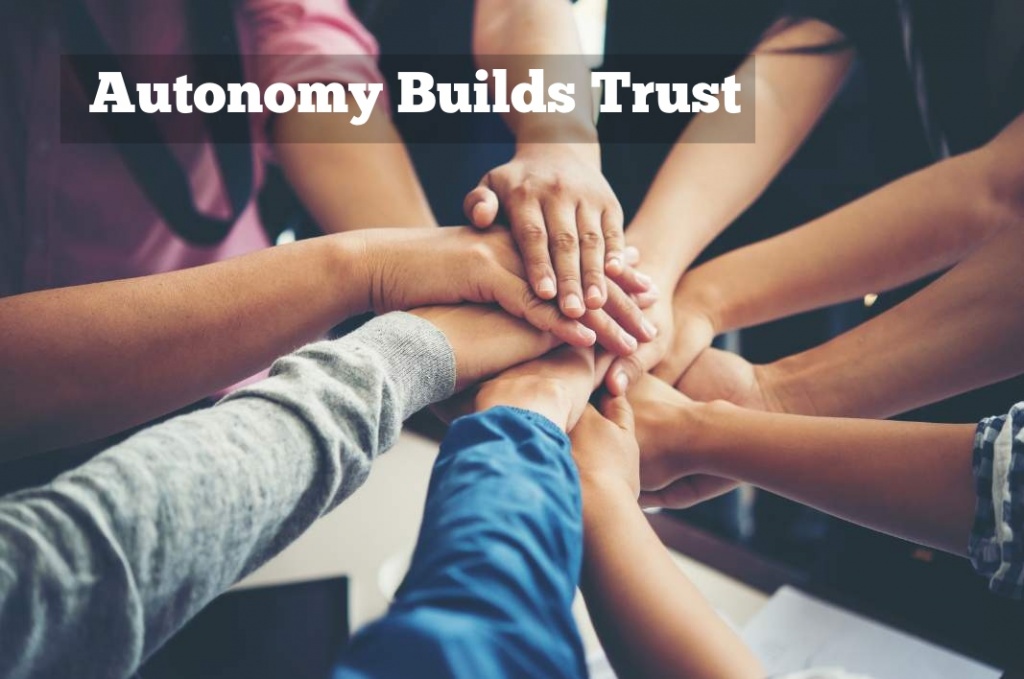
A team without trust isn’t really a team.It’s just a group of individuals, working together, often making disappointing progress.
They will not share information, will often battle over rights and responsibilities, and there won’t any cooperation with one another.
Related: 5 Ways to Encourage Autonomy for An Enjoyable Workplace.
But when trust is in place, each individual in the team becomes stronger and the group can achieve truly meaningful goals together.
In this article we’ll look at the importance of trust, how to
What is Trust?
To trust someone means to rely on someone else to do the right thing.
You believe in the person’s integrity and strength, to the extent that you’re able to put yourself on the line, at some risk to yourself
Why is Trust So Important in a Team?
Trust is essential to an effective team because it provides a sense of safety.
When team members feel safe with each other, they feel comfortable to open up, take appropriate risks, and expose vulnerabilities.
Without trust, there’s less innovation, collaboration, creative thinking, and productivity.
Related: 4 Types of Co- Worker: Which One is You and How to Deal the Rest?
People will spend their time protecting themselves and their interests instead of spending time helping the group to attain its goals.
Trust is also essential for knowledge sharing. A study found that trust was a key element in a team’s knowledge acquisition.
Put simply, if your team members trust one another, they’re far more likely to share knowledge, and to communicate openly.
How To Build Trust Among Employees?
1. Active listening and being receptive
Listening to your colleagues’ ideas encourages openness and begins to create trust.
Practice active listening by paying attention to your co-worker’s word choice, tone and body language.
Related: 7 Tips to Help Strengthen Employee Bond.
Try to understand the points he or she makes by restating those points, ask questions for more clarification and don’t defer until you’ve heard it all appropriately.
Your openness and understanding will encourage others to consider your opinions and ideas as fairly as you consider theirs.
2. Agree to disagree constructively
Disagreement is an
It’s dangerous
Speak consciously with respect when you think your colleague is wrong or missing a key perspective on an issue.
Related: The Ultimate Goal Setting Method You Need To Reach Your 2019 Goal!
When shared constructively, opposing ideas can lead to a better understanding of the issue at hand and provide better solutions.
Set some ground rules for difficult discussions that help participants avoid laying blame.
For example, try identifying a point of agreement, expanding on why you agree, and adding suggestions to expand or improve upon the ideas you’re discussing.
3. Keep matters within confidentiality
Nothing harms a relationship more than inappropriately sharing information that should be kept private.
A report by Forbes suggests that nearly 2/3 of workplace trust is broke because of gossipping.
Employees perceive any unauthorized sharing as talk that’s negatively evaluating them.
Related: The Best and Most Practical Way to Increase Transparency Across Organization.
That’s why, even if the information-sharing seems harmless to you, the violation can cause others to question your trustworthiness and your overall esteem for them.
Always keep sensitive information to yourself unless you have received explicit permission to share it.
4. Be honest even when you disagree
Honesty might sound like an overly simple piece of advice, but it’s truly at the heart of building effective personal and professional relationships.
When you’re asked a straightforward, reasonable question, answer it truthfully, even if you know your opinion might be different from your colleague’s.
That includes admitting when you don’t know the answer or when you’re not at liberty to share certain facts or data.
The first step is being honest with yourself about your knowledge, feelings, and boundaries.
Related: Why DO MILLENNIALS Change Jobs So Often and How To Keep Them?
Take responsibility for your feelings and tell the truth if you’ve made a mistake.
Modeling honest behavior will promote honesty within the team, which will increase trust and, ultimately, productivity.
Autonomy Builds Trust.
The goal of a working team is to get things done in a way that best supports your organization and customers.
Trust and respect are at the heart of good working relationships. Without those relationship building blocks, you won’t be able to reach that goal.
Autonomy Business Model (ABM) is the power tool to shape your work environment in ways that allow you to perform at your best.
The bottom-line benefit of ABM is both employees and organizations are free to make more choices, more committed to their jobs, are more productive and less likely to leave.
Autonomy leads to trust as workers are free to make their own commitment choices and express their opinions.
It will align everyone under the basis of trust to work towards a common goal.
Do you think giving more freedom to employees will open up more room for self-growth and creativity? Or the idea of working with no boundaries with decrease discipline and committed?
Let us know your thoughts in the comment section below.

